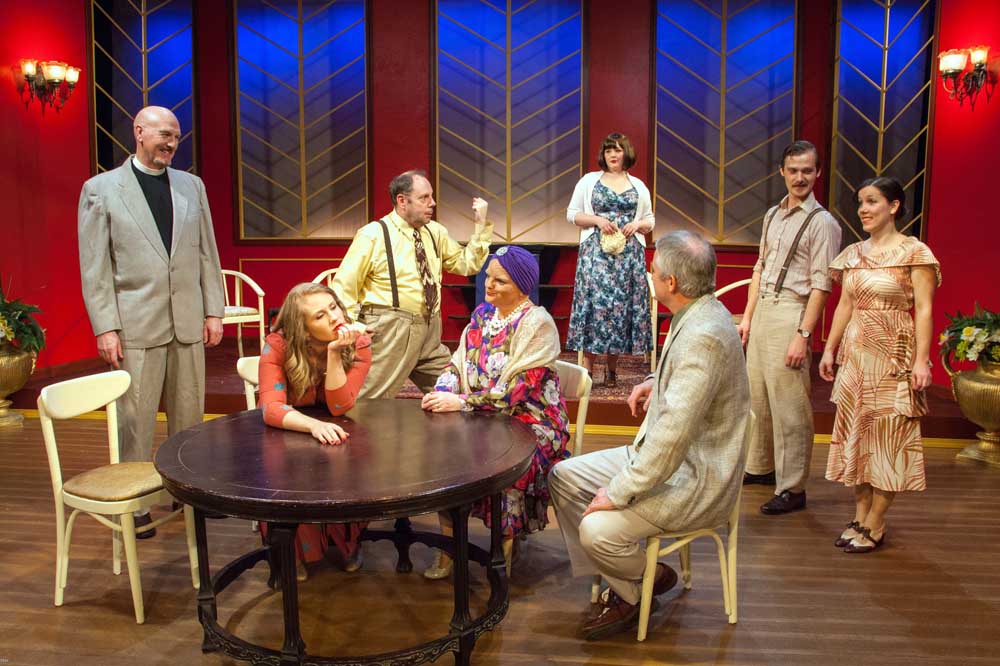Who done it!? Coaster Theatre stages Agatha Christie’s ‘Murder on the Nile’
Published 10:00 am Monday, March 16, 2015

- “Murder on the Nile,” a mystery by Agatha Christie, is running now through April 18 at the Coaster Theatre.
Jenni Tronier, an actor and employee of the Coaster Theatre Playhouse since 2013, makes her debut as a Coaster director this month with Agatha Christie’s 1946 play, “Murder on the Nile.”
Adapted from Christie’s 1937 novel “Death on the Nile,” the play tells the story of 12 characters — including a newlywed couple, a jilted fiancé, a Socialist, a German tourist and a wealthy, snobbish old lady — whose lives intersect aboard a paddle steamer traveling south along the Nile River from Aswan to Wadi Halfa.
And, since this is an Agatha Christie story, “Someone dies, people are suspected and blamed, and then it’s up to the one detective character to figure it all out,” Tronier said. “It’s hard to summarize without giving too much away.”
The show, which clocks in at roughly two hours and 15 minutes with intermission, opened March 13 and runs through April 18. It contains adult themes and theatrical gunshots but no foul language; if it was a movie, it would be rated PG.
Christie (1890-1976) is famous for her crime novels, short stories and plays. Her name is “synonymous with the classic murder mystery,” said Tronier, who first read “Death on the Nile” in high school.
“Agatha Christie is her own genre, really,” said David Sweeney, who plays the Germanic Dr. Bessner. “There are a lot of mystery plays, but, basically, she’s a benchmark in theater and in detective novels. So, a lot of times, people will be compared to her work: ‘This is like Agatha Christie, blah, blah, blah.’ It’s sort of like going to the source, to do a play that she wrote.”
Frank Jagodnik and Liz McCall, a married couple, count themselves Christie fans. “I used to read her books when I was a child,” said McCall who plays Louise, a maid.
This is the third Christie play the Coaster has put on, and “if there’s an Agatha Christie, we try to be in it,” said Jagodnik, who plays the detective, Canon Pennefather.
“Murder on the Nile” keeps the audience on its toes, Tronier said.
“That’s the one thing about a good murder mystery, is that you’re constantly trying to figure out whodunnit,” she said. Audience members should be asking themselves, “What are the clues? Where are the red herrings? Where can I find just a hint of who the murderer is?”
One of Christie’s strengths as a storyteller is her ability to create a memorable, well-developed cast of characters, said Ellen Jensen, who plays Jacqueline de Severac.
“Every character is very specific, and every character is definitely unique and motivated in their own way. It’s a lot of human nature,” she said.
What’s more, Christie “not only creates unique characters, but then (she) creates unique relationships between specific pairs of characters,” added Mick Alderman, who plays Simon Mostyn, a penniless newlywed. Alderman also designed the lighting for the play.
Trapped in a small space, the comedy and tension among the characters escalates. Then “they start killing each other,” Jagodnik said.
“It would still probably be entertaining without the murder … just not as much,” Jensen quipped.
In “Murder on the Nile,” the river and the setting are practically characters in themselves, Tronier said. Christie “brings the romanticism of the 1920s, 1930s Egypt to life.”
Thoughtful viewers may enjoy Christie’s take on the social structure of early 20th century England.
“It’s really common in a lot of English plays of this period that some, if not all, of the tension comes from class and social standing,” Tronier said. “English aristocratic society was breaking down … The lines between the haves and have-nots were blurring, and there were people who liked that and people who didn’t.”
The Miss Ffolio-Ffoulkes character, played by Jean Rice as “dripping with silliness and a kind of kookiness,” is “very concerned about everybody’s position and who is lesser than her — and she’s not afraid to show it,” Tronier said.
“Even the Communist character who wants equality is still demeaning toward people who are ‘lower’ than him,” Jensen said. The class structure is “so ingrained in them.”
Each actor has had to overcome at least one challenge with his or her character. For McCall, it was having to act subservient. For Sweeney, it was mastering a convincing Germanic syntax. For the happily married Amie Fipps, it was playing a bachelorette.
But for the entire cast, who has been living with the material since December, the biggest challenge will be “remembering it’s brand new to the audience, and we have to bring it fresh every time we do it and not allow ourselves to remember where it ends. We have to be in each moment as it develops,” Sweeney said. This is true of every play, of course, but, “in a mystery especially, it’s more of a distinct challenge in some ways not to play the outcome.”
But even after the audience knows the outcome, that doesn’t mean the entertainment value of the play has diminished. After all, knowing who the killer is can make for a new experience the second time through.
“Hey, I’ve been entertained, and I’ve seen it quite a few times,” Tronier said, laughing.




